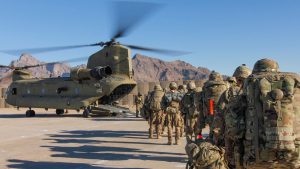As the US military finally pulls out of Afghanistan after nearly 20 fruitless years, I have a few lingering questions. But let’s start with some facts.
The Associated Press has published a list of the costs of America’s longest war. The human toll: the deaths of 2,448 US service members; 3,846 US contractors; 444 aid workers; 72 journalists; 66,000 Afghan military and police; and 47,245 Afghan civilians. And that doesn’t include the thousands injured.
The AP points out that President Harry Truman temporarily raised top income tax rates to 92% to pay for the Korean War and LBJ temporarily raised top tax rates to 72% to pay for the Vietnam War. But President George W. Bush cut tax rates for the wealthiest 8%, rather than raise them, just as the US began sending into Afghanistan. Remember that every time a GOP politician talks about how wrong it is to increase the budget deficit for vital domestic expenses and social services. The only ones for whom the US presence in Afghanistan was a positive are the war profiteers, the defense contractors you and I propped up with our tax dollars.
We’re far from done paying for this debacle. Linda Bilmes of Harvard University’s Kennedy School estimates that, on top of the one trillion dollars spent on the war in Afghanistan, the US has committed to paying more than $2 trillion for health care, disability, burial and other ongoing costs for roughly 4 million veterans. Those service members certainly deserve every benefit they can get. After all, they merely followed orders and went where their higher-ups told them to go.
Yet, considering all of that, I wonder:
- Do families of soliders who died in Afghanistan believe their sons, daughter, fathers, mothers, sisters, and brothers gave their life for a good cause?
- What about all the soliders suffering from missing limbs and PTSD from multiple deployments to Afghanistan?
- After 20 years, why haven’t Afghan forces learned how to defend their own country?
- Is it them or is there something wrong with the American method of training?
- How many Afghan women who grew up in the non-Taliban generation will leave the country rather than suffer the brutal oppression that’s sure to reoccur as the Taliban returns to power?
- How much infrastructure repair on our home front could have been done with the money and people wasted in Afghanistan?
- Who could possibly believe that the US staying another year, or five years, or ten, would make any difference?
And most importantly:
- Have US political and military leaders finally learned a lesson they should have known after Vietnam — that we must stop intervening in internal matters of other nations whose culture and history we don’t fully understand?

